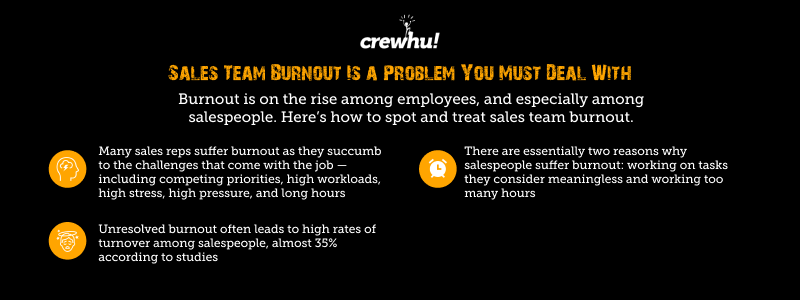Sales Team Burnout Is a Problem You Must Deal With

Burnout is on the rise among employees, and especially among salespeople. Here’s how to spot and treat sales team burnout.

The sales team has one of the highest turnover rates among company departments. And you don’t need 20 years working in any business to see why that is the case: Sales is often a high-pressure, high-stress job where competing priorities, high workloads, and an unsustainable number of working hours are the norm rather than the exception. Sales team burnout is prevalent, and the majority of companies aren’t doing enough to combat it.
In a recent study of sales professionals, two-thirds of participants strongly agreed that they were close to experiencing burnout.
In the study, 57% of respondents reported that their workload was beyond their capacity to successfully accomplish, and 67% revealed that in order to do their jobs, they were working more hours than was stipulated in their contracts
The result of this susceptibility to burnout is the high rate of turnover among sales departments anywhere you look. According to a Bridge Group study, the annual turnover rate among sales professionals is 34.7%.
That signifies over 1 in 3 professionals, which is a costly scenario for any business given that the average onboarding and ramp-up period for a sales professional is nine months or more.
Causes of burnout in sales
There are basically two major reasons why salespeople may find themselves inching closer to burnout:
- 1. Doing work they don’t enjoy
Burnout tends to start creeping in when sales reps are working on tasks they don’t find meaningful or working in an environment they don’t like.
This scenario is much more common than many company founders and leaders realize. Of course, it’s not realistic to expect your workers to love their work every moment of every single day – anything could happen to change the mood at the office.
However, not enough business leaders appreciate the positive impact of working towards a goal and caring about the well-being of the people you work with.
A positive company culture greatly increases the potential for both output and employee satisfaction. Team members who feel recognized and appreciated are more engaged and passionate about their work and would not mind working long hours to make sure goals are met.
Where employees don’t feel recognized, they are more susceptible to burnout.
- 2. Working too many hours:
Sales reps are also prone to burnout when they work too many hours for too long. The occasional overtime here and there is not a problem, but consistently working too many hours is a recipe for burnout.
If your sales reps are sleeping at the office in order to increase their close rate or meet goals, then you’re on a fast track to trouble. In today’s goal-oriented, bottom-line obsessed world, it might seem like a good thing to stay at the office so long that other parts of your life (like getting adequate amounts of sleep, bonding with family, and catering to your health) get neglected. However, that just leads to burnout.
How to spot burnout in your sales team
There are a few signs you should watch out for among your sales team because they could signify burnout:
- 1. Reps don’t know how to measure success: Salespeople typically think in terms of monthly or quarterly goals when it comes to measuring their success. This can work against them and lead to burnout. Without smaller, more quickly achieved goals and successes to celebrate before the month or quarter runs out, they can end up feeling demotivated or burned out.
- 2. Sales reps no longer care about professional development: If you find your sales reps are so focused on closing deals and upping their closure rates that they no longer care for any form of self-development, they may be heading for burnout. Healthy salespeople actively try to learn new techniques, adopt new technology, and improve their communication skills
- 3. Sales reps lack motivation: When salespeople start caring less about their performance and are easily distracted by everything going on around them, it’s time to pay attention. If behavior like this comes out of nowhere and is completely uncharacteristic for those concerned, the chances are strong that they may be dealing with burnout.
- 4. Sales reps start getting negative: It can be tricky to differentiate between when a sales rep is being sarcastic and when they are being negative. Sales reps need to vent out the inevitable frustrations they encounter in the field, after all. However, when you notice someone has become a persistent source of negativity over a long period of time, it’s time to take a closer look at what is going on.
- 5. Sales reps become impervious to change: Sales reps will usually stick with what works, and this could make them somewhat impervious to change. But one identifier of passionate salespeople (those far from suffering from burnout) is the ability and willingness to change with customer and industry trends. Change is a great way to keep burnout at bay.
Healing sales team burnout
Any attempts to reverse the effects of burnout in your company must start with identifying what the causes are in the first place so they can be eliminated or mitigated.
If your workers are stressed out because they don’t enjoy the work environment, countermeasures like employee recognition programs could help.
If they’re working too many hours, keep an eye on the number of hours your employees spend at the office.
There are no simple answers, but awareness and recognition are good starting points.
Contact Crewhu
Crewhu is the first platform to combine customer service management with employee recognition. Our solutions make it easy to collect customer, employee, and management feedback to use in boosting employee performance.
With the right data, you can easily spot trends that signal burnout among your sales team and get ahead of the problem. Check out this resource guide that offers tips on how to prevent burnout.






